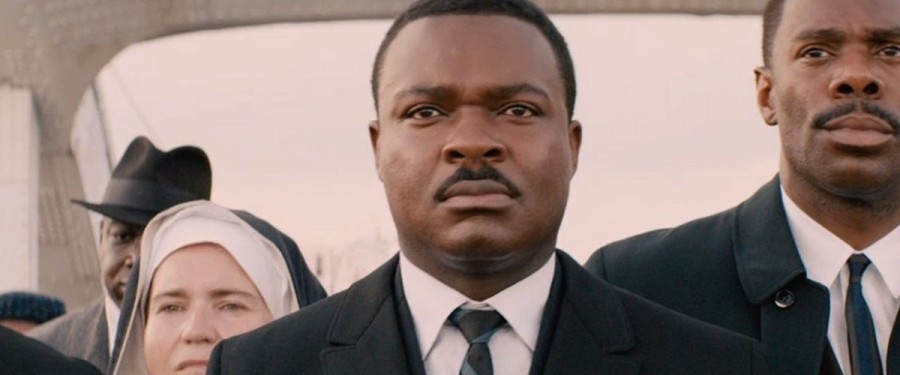Now Showing: “Selma”
“Selma” chronicles Martin Luther King Jr’s campaign to secure equal voting rights in a march from Selma to Montgomery, Alabama.
January 19, 2015
“I have a dream,” is what one would expect to hear in a film about Martin Luther King Jr., whose most famous speech is a symbol of his and many others’ efforts to stop segregation in the South. However, this speech is not part of director Ava DuVernay’s “Selma” because the film instead artfully portrays a conflict from King’s life that is not as well remembered— the right of African Americans to vote.
Bypassing King’s (David Oyelowo) early rise as a civil rights figure, the “Selma” of 1965 becomes the center ground of King’s movement. During this time, everyone knows that African Americans can legally vote, but for years Southern registrars have found ways to keep them away from the polls. As King is unable to make President Lyndon Johnson do anything concrete about this, he encourages the people of Selma to take part in his attempts at peaceful marches. With the end goal of government action firmly on his mind, he has to deal with the recoil that affects not only him and his demonstrators, but also his family.
Like other movies about notorious figures from recent history, there really isn’t a way to include plot twists into someone’s life account. However, many of those with even some knowledge of the civil rights movement often forget some of the overlooked tragedies of the time, which are brutally and artistically strewn into the film’s plot. Although some moments of the film can be seen as dry because they are purely about politics, the audience can come to expect sudden changes in pace that are hard to accomplish in a biographical film.
For most of us, subtle racism is one of the only forms of evil that we might encounter. The Ferguson and Trayvon Martin cases are some of the best-known but still very much debated examples of fatal racism in this country. The same cannot be said for police brutality, in Ferguson and in any other place. For this reason, the scenes of tension between African American activists and white policemen are captivating and dreamlike, not only because of their accurate attempts to artistically recreate violent racism, but also to connect the brutality of yesterday with a relevant contemporary fear.
While Oyelowo is credible for portraying the strong spirited King, the rest of the cast deserves just as much credit. Notable among them are Oprah Winfrey and Carmen Ejogo, who play Annie Lee Cooper and Coretta Scott King respectively, as well as Henry G. Sanders as martyr Jimmy Lee Jackson’s grandfather. Winfrey and Ejogo dramatically portray two different sides of women’s roles and struggles in the movement, and it is hard not to be moved by the physical and emotional pain that Sander’s character faces in the events of the film.
One final aspect of the film that I felt strongly about, and which is something that I do not often pay much attention to when I first watch a movie, is “Selma’s” musical score. Although I cannot remember the details of the music, it worked well with the scenery and the sporadic ambience between gravitas and hope in the film. For those who do not normally stay for the end credits—it will be worth it just to hear “Glory” by John Legend and Common.
I would say suggest that “Selma” be visited on reflection of Martin Luther King’s influence this weekend. Rather than reviewing the heroisms and purity of King’s work, it showcases the realities of civil rights work. While “Selma” does not thoroughly protect King’s personal legacy and name, it does well in drawing focus to the movement at large and the idealism behind it.



